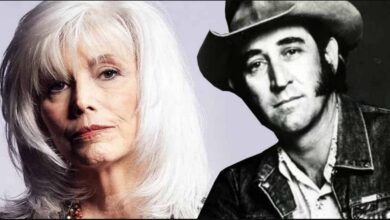Freddy Penned This Song In 1956, And It Finally Became A Hit In The 70s. Way To Go, Freddy!
Freddy Fender, born Baldemar Garza Huerta on June 4, 1937, in San Benito, Texas, was a trailblazer in the realms of Tex-Mex music, country, and rock. Growing up in the Rio Grande Valley, he was heavily influenced by the rich musical traditions around him, blending the sounds of different genres, including traditional Mexican music and American rock and roll. This unique fusion would become a hallmark of his career, setting him apart in the music industry.
Fender’s early life was marked by difficulties. He faced the challenges of being a young Mexican-American in a time when cultural acceptance was still evolving. Despite these hardships, he found solace in music. He began playing guitar at a young age, and by the time he entered his teenage years, he was performing in local clubs. His passion for music was evident, and he quickly developed a unique style that resonated with audiences.
In the late 1950s, he recorded the original version of “Wasted Days and Wasted Nights.” This heartfelt song, reflecting themes of love and longing, was a straightforward expression of his emotions and showcased his deep, resonant voice. However, the song’s initial release did not garner the attention it deserved, primarily due to Freddy’s legal troubles stemming from a marijuana possession conviction. This setback temporarily derailed his burgeoning career, leading to his incarceration during a critical period for artist development.
Despite the challenges he faced, Fender’s artistic spirit remained unbroken. After serving his time, he re-emerged in the early 1970s, a period that marked a significant turning point in his life. His 1974 single “Before the Next Teardrop Falls” soared to the top of the charts, reaching No. 1 on the Billboard Hot 100 and solidifying his status as a major country music star. This immense success catalyzed a resurgence of interest in his earlier work, including a re-recording of “Wasted Days and Wasted Nights” in 1975, which resonated deeply with audiences and reached No. 1 on the Billboard Country chart.
The re-recording of “Wasted Days and Wasted Nights” was a revelation. With its lush instrumentation and Fender’s emotional delivery, the song made its mark on popular music. It highlighted his unique ability to blend various musical influences, earning him a diverse fan base. The success of this song, alongside others, showcased his resilience and ability to adapt, further enriching the landscape of both country and Tejano music.
Freddy Fender’s impact extended beyond his own recordings. He played a significant role in promoting Tejano music and country crossover, influencing a generation of musicians who came after him. His work paved the way for other artists to explore their cultural roots within broader musical frameworks. In addition to his recordings, Fender was known for his engaging live performances, where his charisma and stage presence captivated audiences.
Throughout the 70s and 80s, Fender continued to release successful albums and singles. He was recognized for his contributions to music with several accolades, including Grammy nominations and wins. In 2002, he was inducted into the Texas Country Music Hall of Fame, a testament to his legacy and influence within the genre. His induction reflected not only his musical achievements but also his role in bringing attention to the richness of Texan music culture.
Despite the successes and recognition he achieved, Fender remained humble and connected to his roots. He often spoke about the importance of his heritage and the influence of his upbringing on his music. He remained active in the music scene until his health began to decline. His career spanned several decades, during which he produced a significant body of work that continued to resonate with fans of various backgrounds.
Tragically, Freddy Fender’s life came to an end on October 14, 2006. However, his music has endured, inspiring countless musicians and captivating fans around the world. His songs, particularly “Wasted Days and Wasted Nights” and “Before the Next Teardrop Falls,” are celebrated as classics, their emotional weight still felt in performances today. Freddy Fender’s legacy is one of resilience, creativity, and cultural representation, demonstrating the universal power of music to transcend barriers and connect people.
As we look back on his life and artistry, we are reminded of the importance of perseverance and passion. Freddy Fender’s journey from adversity to acclaim illustrates how music can serve as a powerful outlet for personal expression and cultural storytelling. His contributions not only enriched the music industry but also paved the way for greater acceptance and celebration of diverse musical influences. His spirit and sounds live on, continuing to inspire and entertain new generations of listeners.
&ab_channel=MariolaLubera





